本专栏知识点是通过零声教育的线上课学习,进行梳理总结写下文章,对c/c++linux课程感兴趣的读者,可以点击链接https://xxetb.xetslk.com/s/12PH1r C/C++后台高级服务器课程介绍 详细查看课程的服务。
KNI原理
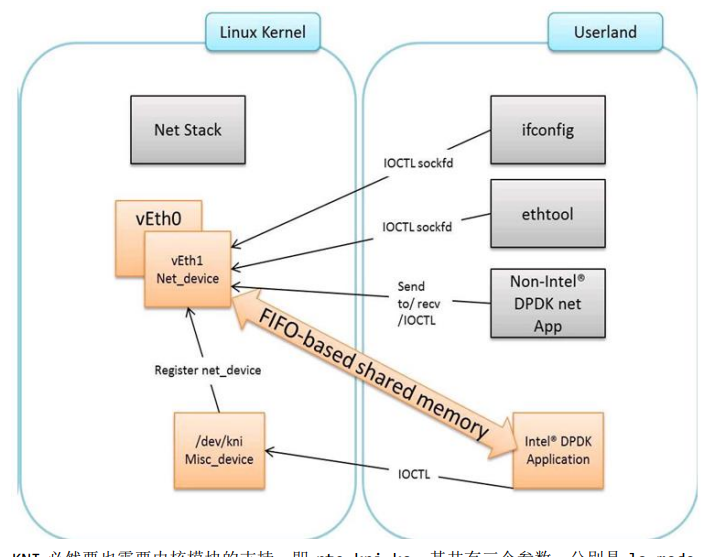
dpdk用户层程序与kni之间使用的是共享内存

KNI内核模块的实现
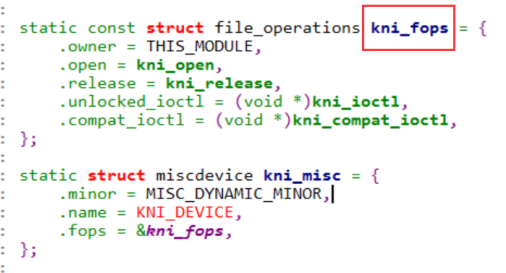
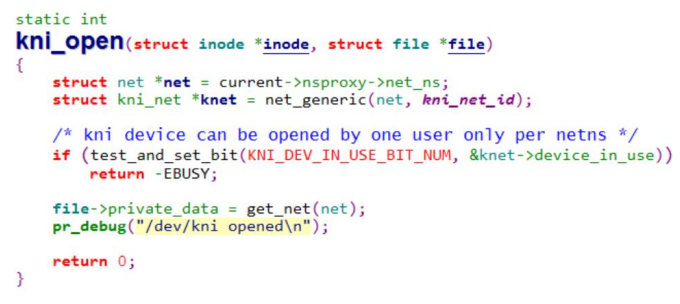
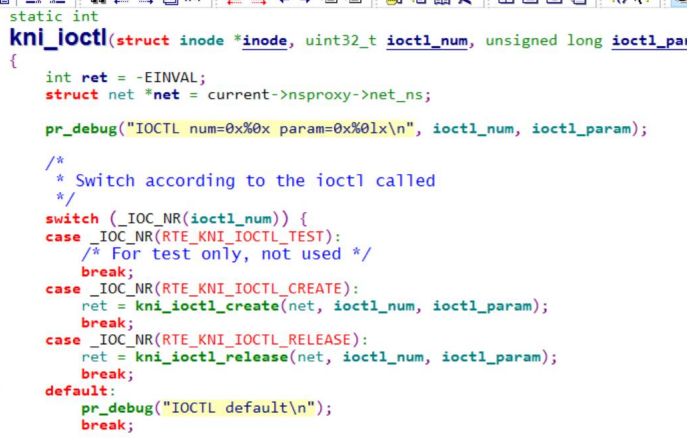
代码实现
udp包发送的实现
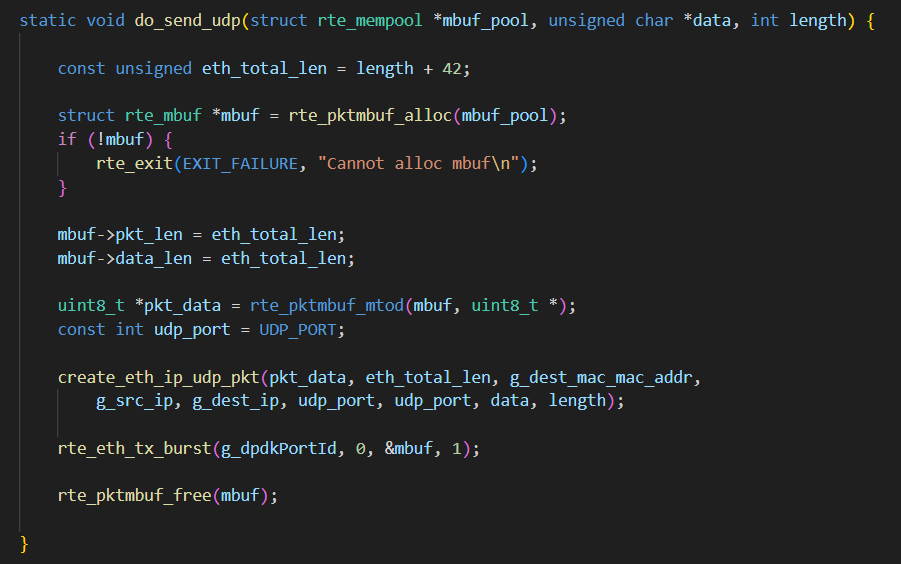
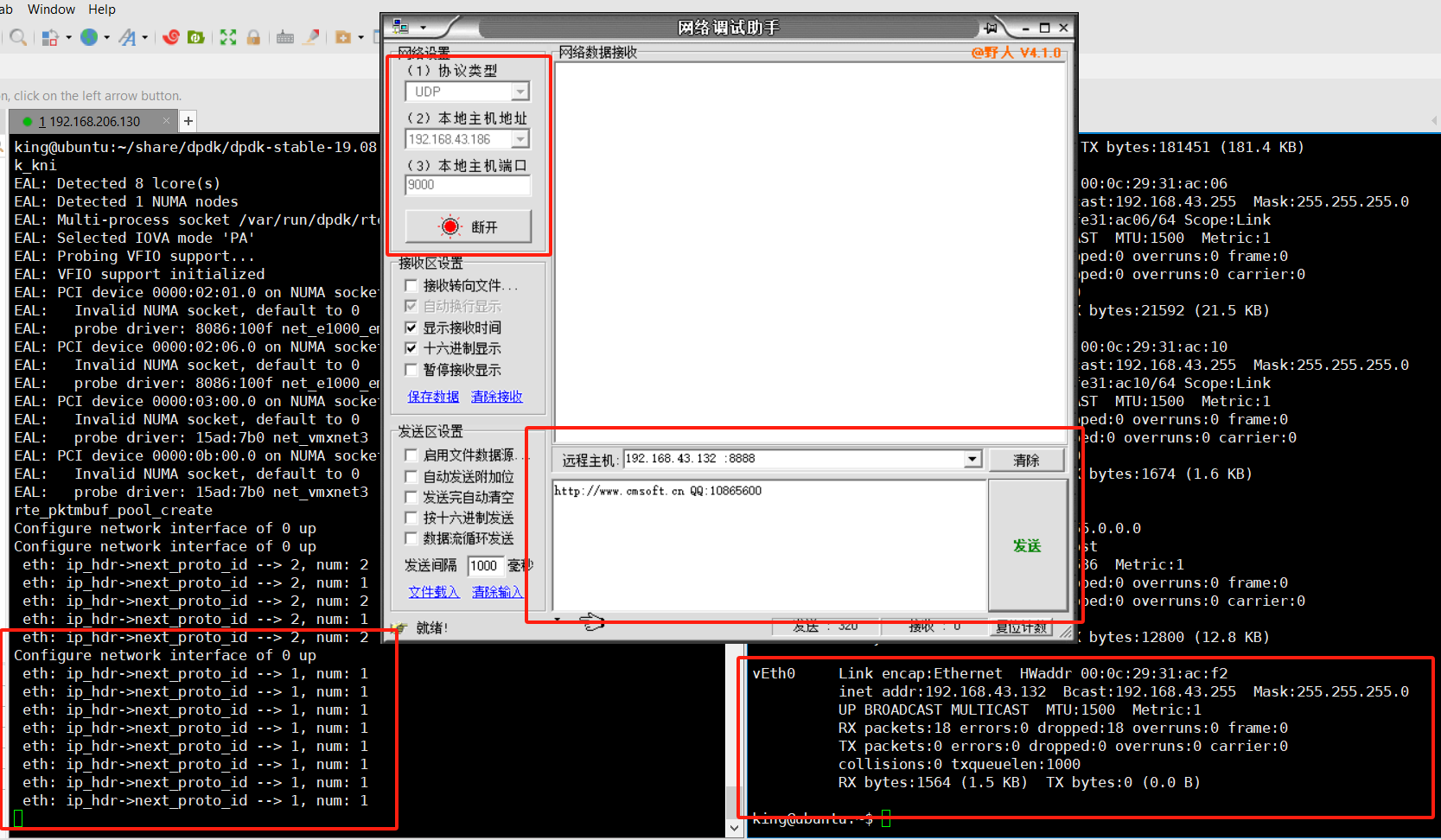
arp包发送的实现
arp的作用:局域网内两台机器通信的基础,arp表主要做的是mac地址与ip地址之间的映射关系
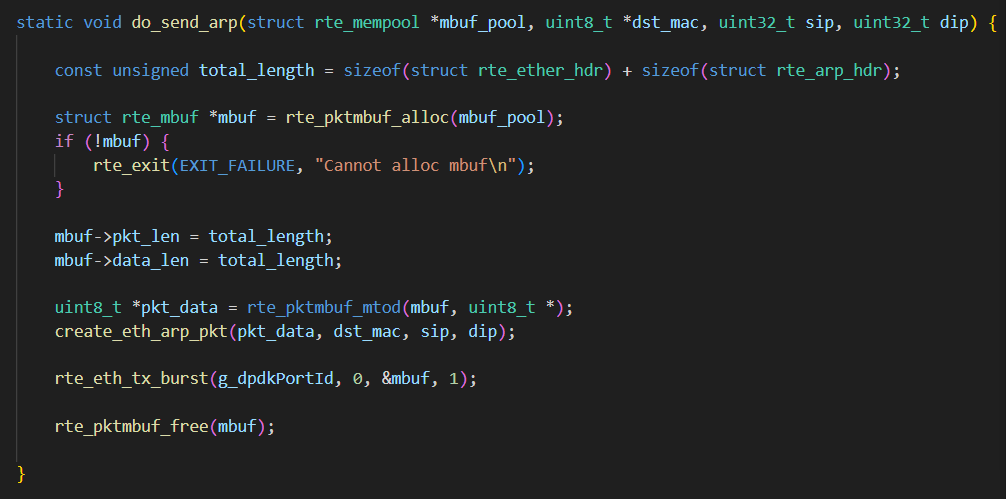
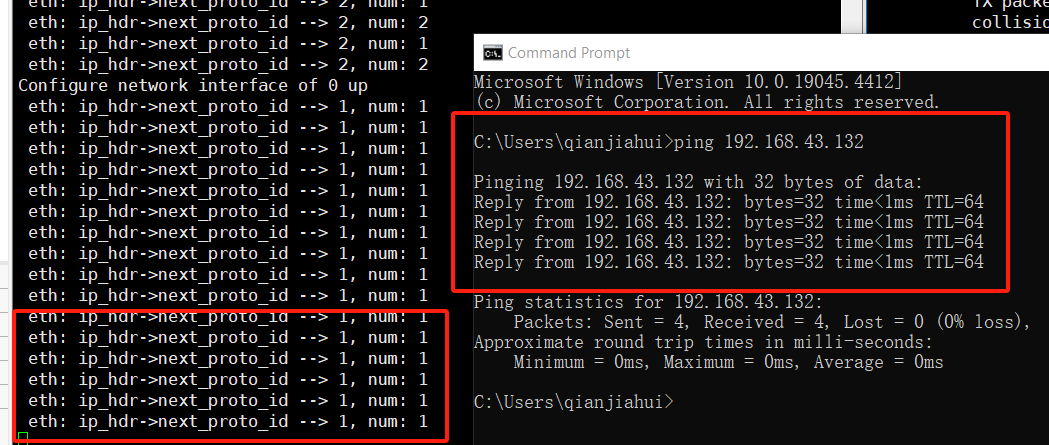
tshark捕获udp数据包
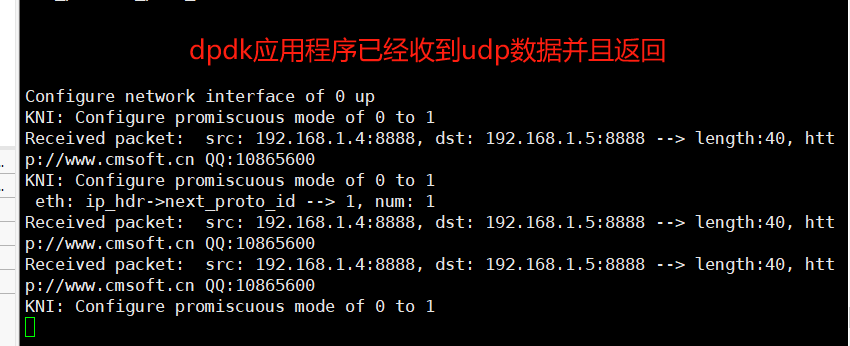
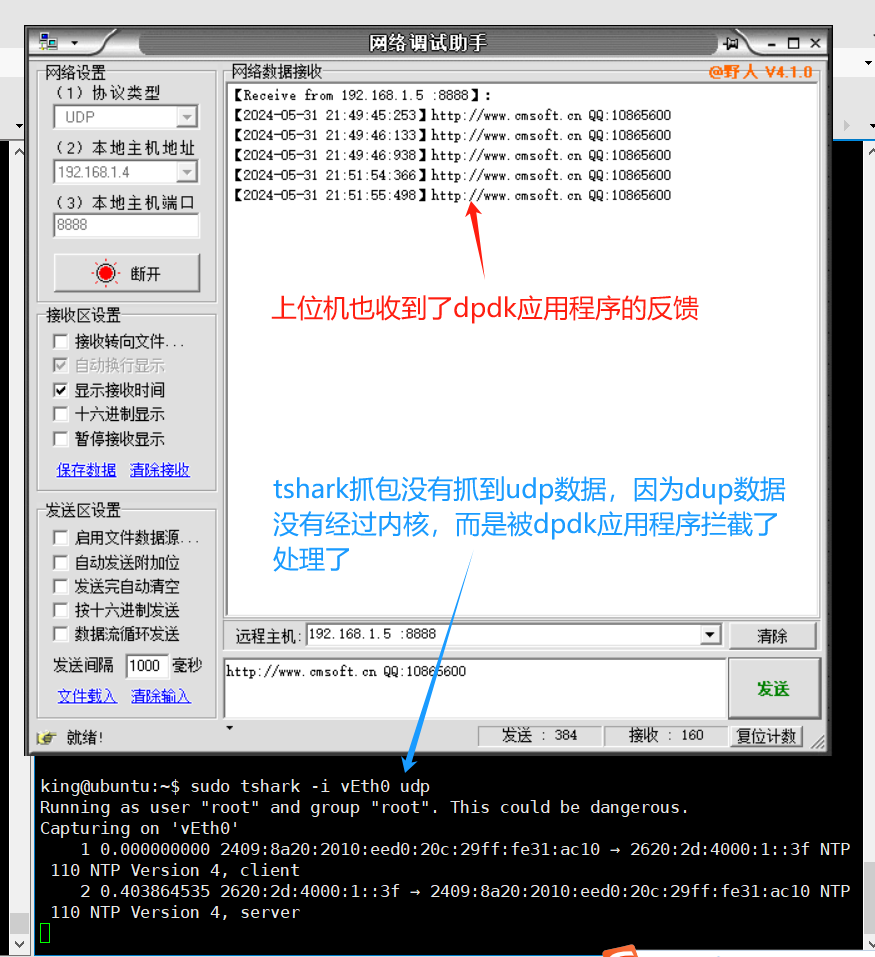
tshark捕获tcp数据包

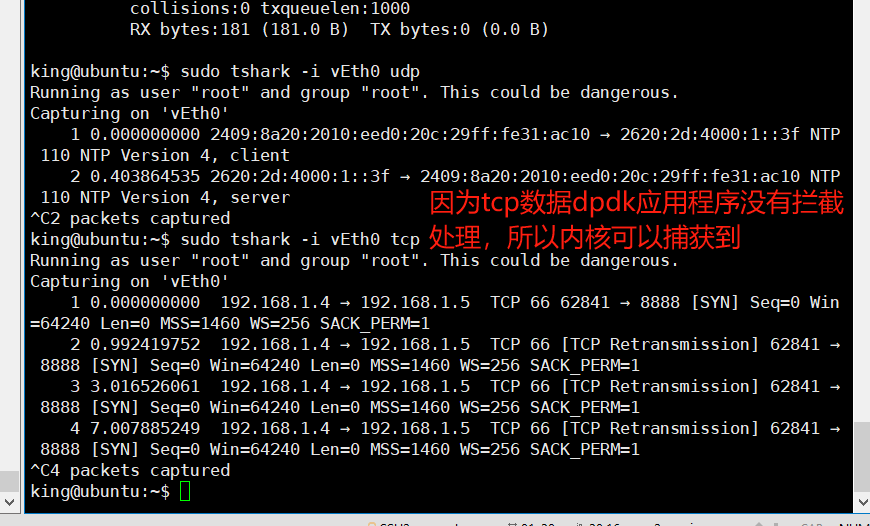
tshark捕获icmp数据包
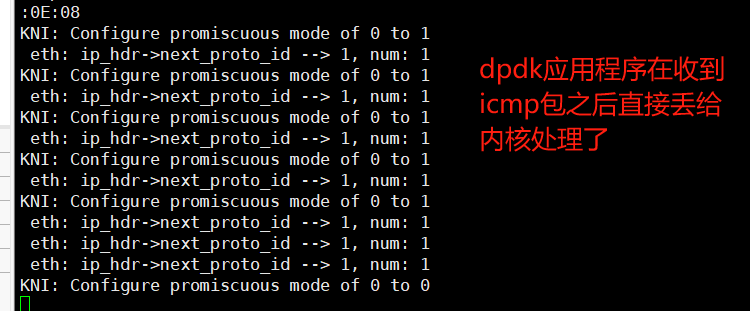
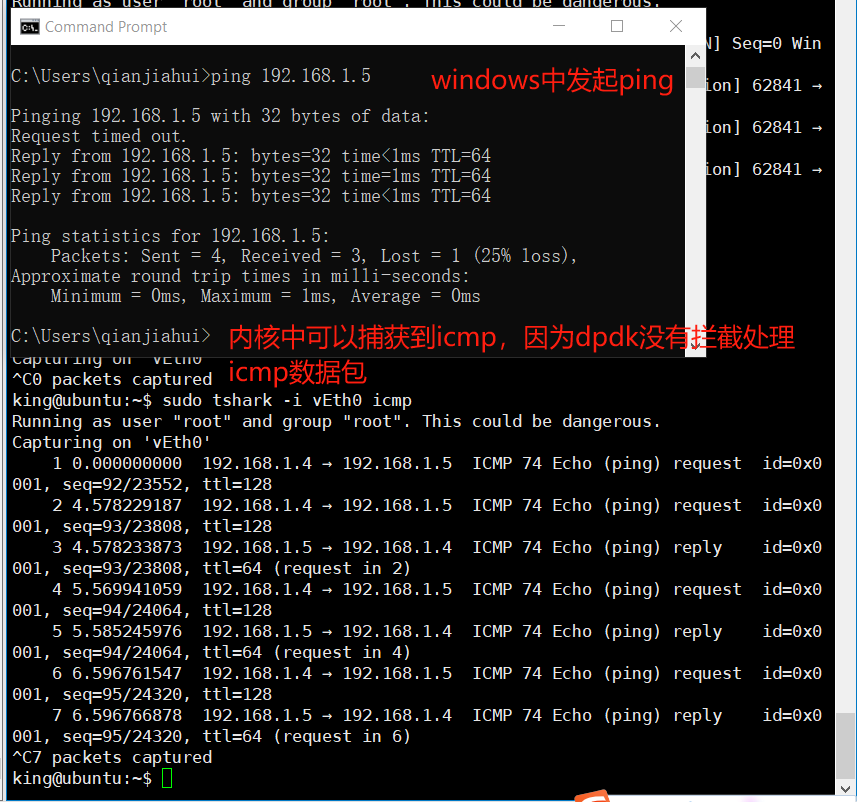
完整代码实现
#include <rte_common.h>
#include <rte_eal.h>
#include <rte_ethdev.h>
#include <rte_mbuf.h>
#include <rte_kni.h>
#include <stdio.h>
#include <linux/if_ether.h>
#include <arpa/inet.h>
#include <netinet/ip.h>
#include <netinet/udp.h>
#define ENABLE_KNI 1
#define RX_RING_SIZE 1024
#define TX_RING_SIZE 1024
#define NUM_MBUFS 8191
#define MBUF_CACHE_SIZE 0
#define MAX_PACKET_SIZE 2048
#define MBUF_DATA_SIZE (MAX_PACKET_SIZE+RTE_PKTMBUF_HEADROOM)
#define BURST_SIZE 128
#define DPDK_QUEUE_ID_RX 0
#define UDP_PORT 8888
int g_dpdkPortId = -1;
struct rte_mempool *pktmbuf_pool = NULL;
static const struct rte_eth_conf port_conf_default = {
.rxmode = { .max_rx_pkt_len = RTE_ETHER_MAX_LEN },
#if ENABLE_KNI
.txmode = { .mq_mode = ETH_MQ_TX_NONE}
#endif
};
#define MAKE_IPV4_ADDR(a, b, c, d) (a + (b<<8) + (c<<16) + (d<<24))
static uint32_t g_src_ip = MAKE_IPV4_ADDR(192, 168, 1, 5);
static uint32_t g_dest_ip = MAKE_IPV4_ADDR(192, 168, 1, 4);
static uint8_t g_dest_mac_mac_addr[RTE_ETHER_ADDR_LEN] = {0x00, 0x0c, 0x29, 0x31, 0xac, 0xf2};//{ 00:0c:29:31:ac:f2 };
static uint8_t g_src_mac_addr[RTE_ETHER_ADDR_LEN];
static void port_init(struct rte_mempool *mbuf_pool) {
g_dpdkPortId = 0;
uint16_t nb_sys_ports = rte_eth_dev_count_avail();
if (nb_sys_ports == 0)
rte_exit(EXIT_FAILURE, "No supported Ethernet device found\n");
struct rte_eth_dev_info dev_info;
struct rte_eth_conf local_port_conf = port_conf_default;
rte_eth_dev_info_get(g_dpdkPortId, &dev_info);
if (dev_info.tx_offload_capa & DEV_TX_OFFLOAD_MBUF_FAST_FREE)
local_port_conf.txmode.offloads |= DEV_TX_OFFLOAD_MBUF_FAST_FREE;
const int num_rx_queues = 1;
const int num_tx_queues = 1;
struct rte_eth_conf port_conf = port_conf_default;
if (rte_eth_dev_configure(g_dpdkPortId, num_rx_queues, num_tx_queues, &port_conf)) {
rte_exit(EXIT_FAILURE, "rte_eth_dev_configure() failed.\n");
}
uint16_t nb_txd = TX_RING_SIZE;
uint16_t nb_rxd = RX_RING_SIZE;
rte_eth_dev_adjust_nb_rx_tx_desc(g_dpdkPortId, &nb_rxd, &nb_txd);
// Set up RX queue.
struct rte_eth_rxconf rxq_conf = dev_info.default_rxconf;
rxq_conf.offloads = local_port_conf.rxmode.offloads;
if (rte_eth_rx_queue_setup(g_dpdkPortId, DPDK_QUEUE_ID_RX, RX_RING_SIZE,
rte_eth_dev_socket_id(g_dpdkPortId), &rxq_conf, mbuf_pool) < 0) {
rte_exit(EXIT_FAILURE, "Couldn't setup RX queue.\n");
}
// Set up TX queue.
struct rte_eth_txconf txq_conf = dev_info.default_txconf;
txq_conf.offloads = local_port_conf.txmode.offloads;
if (rte_eth_tx_queue_setup(g_dpdkPortId, 0, nb_txd,
rte_eth_dev_socket_id(g_dpdkPortId), &txq_conf) < 0) {
rte_exit(EXIT_FAILURE, "Couldn't setup TX queue.\n");
}
// Start the Ethernet port.
if (rte_eth_dev_start(g_dpdkPortId) < 0) {
rte_exit(EXIT_FAILURE, "Device start failed.\n");
}
// Enable RX in promiscuous mode for the Ethernet device.
rte_eth_promiscuous_enable(g_dpdkPortId);
}
static void create_eth_ip_udp_pkt(uint8_t *msg, size_t total_len, uint8_t *dst_mac,
uint32_t src_ip, uint32_t dst_ip, uint16_t udp_src_port, uint16_t udp_dst_port,
uint8_t *data, int length) {
struct rte_ether_hdr *eth = (struct rte_ether_hdr *)msg;
rte_memcpy(eth->d_addr.addr_bytes, dst_mac, RTE_ETHER_ADDR_LEN);
rte_memcpy(eth->s_addr.addr_bytes, g_src_mac_addr, RTE_ETHER_ADDR_LEN);
eth->ether_type = htons(RTE_ETHER_TYPE_IPV4);
struct rte_ipv4_hdr *ip = (struct rte_ipv4_hdr *)(eth + 1);
size_t ip_len = total_len - sizeof(struct rte_ether_hdr);
ip->version_ihl = 0x45;
ip->type_of_service = 0;
ip->total_length = htons((uint16_t)ip_len);
ip->packet_id = 0;
ip->fragment_offset = 0;
ip->time_to_live = 64;
ip->next_proto_id = IPPROTO_UDP;
ip->src_addr = src_ip;
ip->dst_addr = dst_ip;
ip->hdr_checksum = 0;
ip->hdr_checksum = rte_ipv4_cksum(ip);
struct rte_udp_hdr *udp = (struct rte_udp_hdr *)(ip + 1);
//size_t udp_len = ip_len - sizeof(struct rte_ipv4_hdr);
udp->src_port = htons(udp_src_port);
udp->dst_port = htons(udp_dst_port);
udp->dgram_len = htons((uint16_t)(length + sizeof(struct rte_udp_hdr)));
uint32_t *payload = (uint32_t *)(udp + 1);
rte_memcpy(payload, data, length);
udp->dgram_cksum = 0;
udp->dgram_cksum = rte_ipv4_udptcp_cksum(ip, udp);
}
static void do_send_udp(struct rte_mempool *mbuf_pool, unsigned char *data, int length) {
const unsigned eth_total_len = length + 42;
struct rte_mbuf *mbuf = rte_pktmbuf_alloc(mbuf_pool);
if (!mbuf) {
rte_exit(EXIT_FAILURE, "Cannot alloc mbuf\n");
}
mbuf->pkt_len = eth_total_len;
mbuf->data_len = eth_total_len;
uint8_t *pkt_data = rte_pktmbuf_mtod(mbuf, uint8_t *);
const int udp_port = UDP_PORT;
create_eth_ip_udp_pkt(pkt_data, eth_total_len, g_dest_mac_mac_addr,
g_src_ip, g_dest_ip, udp_port, udp_port, data, length);
rte_eth_tx_burst(g_dpdkPortId, 0, &mbuf, 1);
rte_pktmbuf_free(mbuf);
}
static void create_eth_arp_pkt(uint8_t *msg, uint8_t *dst_mac,
uint32_t src_ip, uint32_t dst_ip) {
struct rte_ether_hdr *eth = (struct rte_ether_hdr *)msg;
rte_memcpy(eth->d_addr.addr_bytes, dst_mac, RTE_ETHER_ADDR_LEN);
rte_memcpy(eth->s_addr.addr_bytes, g_src_mac_addr, RTE_ETHER_ADDR_LEN);
eth->ether_type = htons(RTE_ETHER_TYPE_ARP);
struct rte_arp_hdr *arp = (struct rte_arp_hdr *)(eth + 1);
arp->arp_hardware = htons(1);
arp->arp_protocol = htons(RTE_ETHER_TYPE_IPV4);
arp->arp_hlen = RTE_ETHER_ADDR_LEN;
arp->arp_plen = sizeof(uint32_t);
arp->arp_opcode = htons(2);
rte_memcpy(arp->arp_data.arp_sha.addr_bytes, g_src_mac_addr, RTE_ETHER_ADDR_LEN);
rte_memcpy(arp->arp_data.arp_tha.addr_bytes, dst_mac, RTE_ETHER_ADDR_LEN);
arp->arp_data.arp_sip = src_ip;
arp->arp_data.arp_tip = dst_ip;
struct in_addr addr;
char buf[RTE_ETHER_ADDR_FMT_SIZE];
rte_ether_format_addr(buf, RTE_ETHER_ADDR_FMT_SIZE, (struct rte_ether_addr*)&arp->arp_data.arp_sha);
addr.s_addr = arp->arp_data.arp_sip;
printf(" arp src: %s, mac: %s", inet_ntoa(addr), buf);
rte_ether_format_addr(buf, RTE_ETHER_ADDR_FMT_SIZE, (struct rte_ether_addr*)&arp->arp_data.arp_tha);
addr.s_addr = arp->arp_data.arp_tip;
printf(", dst: %s, mac: %s \n", inet_ntoa(addr), buf);
}
static void do_send_arp(struct rte_mempool *mbuf_pool, uint8_t *dst_mac, uint32_t sip, uint32_t dip) {
const unsigned total_length = sizeof(struct rte_ether_hdr) + sizeof(struct rte_arp_hdr);
struct rte_mbuf *mbuf = rte_pktmbuf_alloc(mbuf_pool);
if (!mbuf) {
rte_exit(EXIT_FAILURE, "Cannot alloc mbuf\n");
}
mbuf->pkt_len = total_length;
mbuf->data_len = total_length;
uint8_t *pkt_data = rte_pktmbuf_mtod(mbuf, uint8_t *);
create_eth_arp_pkt(pkt_data, dst_mac, sip, dip);
rte_eth_tx_burst(g_dpdkPortId, 0, &mbuf, 1);
rte_pktmbuf_free(mbuf);
}
#if ENABLE_KNI
static struct rte_kni *kni = NULL;
static rte_atomic32_t kni_stop = RTE_ATOMIC32_INIT(0);
static rte_atomic32_t kni_pause = RTE_ATOMIC32_INIT(0);
int kni_config_mac_address(uint16_t port_id, uint8_t mac_addr[]);
int kni_config_network_if(uint16_t port_id, uint8_t if_up);
int kni_change_mtu(uint16_t port_id, unsigned int new_mtu);
int kni_change_mtu(uint16_t port_id, unsigned int new_mtu) {
int ret;
uint16_t nb_txd = TX_RING_SIZE;
uint16_t nb_rxd = RX_RING_SIZE;
struct rte_eth_conf conf;
struct rte_eth_dev_info dev_info;
struct rte_eth_rxconf rxq_conf;
if (!rte_eth_dev_is_valid_port(port_id)) {
printf("Invalid port id %d\n", port_id);
return -EINVAL;
}
printf("Change MTU of port %d to %u\n", port_id, new_mtu);
/* Stop specific port */
rte_eth_dev_stop(port_id);
memcpy(&conf, &port_conf_default, sizeof(conf));
/* Set new MTU */
if (new_mtu > RTE_ETHER_MAX_LEN)
conf.rxmode.offloads |= DEV_RX_OFFLOAD_JUMBO_FRAME;
else
conf.rxmode.offloads &= ~DEV_RX_OFFLOAD_JUMBO_FRAME;
/* mtu + length of header + length of FCS = max pkt length */
conf.rxmode.max_rx_pkt_len = new_mtu + 14 + 4;
ret = rte_eth_dev_configure(port_id, 1, 1, &conf);
if (ret < 0) {
printf("Fail to reconfigure port %d\n", port_id);
return ret;
}
ret = rte_eth_dev_adjust_nb_rx_tx_desc(port_id, &nb_rxd, &nb_txd);
if (ret < 0)
rte_exit(EXIT_FAILURE, "Could not adjust number of descriptors "
"for port%u (%d)\n", (unsigned int)port_id,
ret);
rte_eth_dev_info_get(port_id, &dev_info);
rxq_conf = dev_info.default_rxconf;
rxq_conf.offloads = conf.rxmode.offloads;
ret = rte_eth_rx_queue_setup(port_id, 0, nb_rxd,
rte_eth_dev_socket_id(port_id), &rxq_conf, pktmbuf_pool);
if (ret < 0) {
printf("Fail to setup Rx queue of port %d\n",
port_id);
return ret;
}
// Set up TX queue.
struct rte_eth_txconf txq_conf = dev_info.default_txconf;
txq_conf.offloads = conf.txmode.offloads;
if (rte_eth_tx_queue_setup(port_id, 0, nb_txd,
rte_eth_dev_socket_id(port_id), &txq_conf) < 0) {
rte_exit(EXIT_FAILURE, "Couldn't setup TX queue.\n");
}
/* Restart specific port */
ret = rte_eth_dev_start(port_id);
if (ret < 0) {
printf("Fail to restart port %d\n", port_id);
return ret;
}
rte_eth_promiscuous_enable(port_id);
return 0;
}
int kni_config_network_if(uint16_t port_id, uint8_t if_up) {
int ret = 0;
if (!rte_eth_dev_is_valid_port(port_id)) {
printf("Invalid port id %d\n", port_id);
return -EINVAL;
}
printf("Configure network interface of %d %s\n",
port_id, if_up ? "up" : "down");
rte_atomic32_inc(&kni_pause);
if (if_up != 0) { /* Configure network interface up */
rte_eth_dev_stop(port_id);
ret = rte_eth_dev_start(port_id);
} else /* Configure network interface down */
rte_eth_dev_stop(port_id);
rte_atomic32_dec(&kni_pause);
if (ret < 0)
printf("Failed to start port %d\n", port_id);
return ret;
}
int kni_config_mac_address(uint16_t port_id, uint8_t mac_addr[]) {
int ret = 0;
if (!rte_eth_dev_is_valid_port(port_id)) {
printf("Invalid port id %d\n", port_id);
return -EINVAL;
}
printf("Configure mac address of %d\n", port_id);
char buf[RTE_ETHER_ADDR_FMT_SIZE];
rte_ether_format_addr(buf, RTE_ETHER_ADDR_FMT_SIZE, (struct rte_ether_addr*)mac_addr);
printf("\tAddress: %s\n", buf);
ret = rte_eth_dev_default_mac_addr_set(port_id,
(struct rte_ether_addr *)mac_addr);
if (ret < 0)
printf("Failed to config mac_addr for port %d\n",
port_id);
return ret;
}
static int init_kni(void) {
uint16_t num_of_kni_ports = rte_eth_dev_count_avail();
if (num_of_kni_ports != 1)
rte_exit(EXIT_FAILURE, "No supported Ethernet device found\n");
rte_kni_init(num_of_kni_ports);
struct rte_kni_conf conf;
snprintf(conf.name, RTE_KNI_NAMESIZE, "vEth%u", g_dpdkPortId);
conf.group_id = (uint16_t)g_dpdkPortId;
conf.mbuf_size = MAX_PACKET_SIZE;
struct rte_eth_dev_info dev_info;
memset(&dev_info, 0, sizeof(dev_info));
rte_eth_dev_info_get(g_dpdkPortId, &dev_info);
rte_eth_macaddr_get(g_dpdkPortId, (struct rte_ether_addr*)&conf.mac_addr);
rte_eth_dev_get_mtu(g_dpdkPortId, &conf.mtu);
struct rte_kni_ops ops;
memset(&ops, 0, sizeof(ops));
ops.port_id = g_dpdkPortId;
ops.change_mtu = kni_change_mtu;
ops.config_network_if = kni_config_network_if;
ops.config_mac_address = kni_config_mac_address;
kni = rte_kni_alloc(pktmbuf_pool, &conf, &ops);
if (!kni)
rte_exit(EXIT_FAILURE, "Fail to create kni for "
"port: %d\n", g_dpdkPortId);
return 0;
}
static int free_kni(uint16_t port_id) {
rte_kni_release(kni);
rte_eth_dev_stop(port_id);
return 0;
}
static void
log_link_state(struct rte_kni *kni, int prev, struct rte_eth_link *link)
{
if (kni == NULL || link == NULL)
return;
if (prev == ETH_LINK_DOWN && link->link_status == ETH_LINK_UP) {
printf( "%s NIC Link is Up %d Mbps %s %s.\n",
rte_kni_get_name(kni),
link->link_speed,
link->link_autoneg ? "(AutoNeg)" : "(Fixed)",
link->link_duplex ? "Full Duplex" : "Half Duplex");
} else if (prev == ETH_LINK_UP && link->link_status == ETH_LINK_DOWN) {
printf( "%s NIC Link is Down.\n",
rte_kni_get_name(kni));
}
}
static void *
monitor_all_ports_link_status(void *arg)
{
uint16_t portid;
struct rte_eth_link link;
unsigned int i;
uint32_t ports_mask = 0x1;
int prev;
(void) arg;
while (1) {
rte_delay_ms(500);
memset(&link, 0, sizeof(link));
rte_eth_link_get_nowait(g_dpdkPortId, &link);
prev = rte_kni_update_link(kni, link.link_status);
log_link_state(kni, prev, &link);
}
return NULL;
}
#endif
static void burst_free_mbufs(struct rte_mbuf **pkts, unsigned num)
{
unsigned i;
if (pkts == NULL)
return;
for (i = 0; i < num; i++) {
rte_pktmbuf_free(pkts[i]);
pkts[i] = NULL;
}
}
int main(int argc, char *argv[]) {
// Initialize the Environment Abstraction Layer. All DPDK apps must do this.
if (rte_eal_init(argc, argv) < 0) {
rte_exit(EXIT_FAILURE, "Error with EAL initialization\n");
}
// Creates a new mempool in memory to hold the mbufs.
pktmbuf_pool = rte_pktmbuf_pool_create("MBUF_POOL", NUM_MBUFS,
MBUF_CACHE_SIZE, 0, RTE_MBUF_DEFAULT_BUF_SIZE, rte_socket_id());
if (!pktmbuf_pool) {
rte_exit(EXIT_FAILURE, "Couldn't create mbuf pool\n");
}
printf("rte_pktmbuf_pool_create\n");
port_init(pktmbuf_pool);
rte_eth_macaddr_get(g_dpdkPortId, (struct rte_ether_addr*)g_src_mac_addr);
#if ENABLE_KNI
init_kni();
/*
pthread_t kni_link_tid;
int ret = rte_ctrl_thread_create(&kni_link_tid,
"KNI link status check", NULL,
monitor_all_ports_link_status, NULL);
if (ret < 0)
rte_exit(EXIT_FAILURE,
"Could not create link status thread!\n");
*/
#endif
while (1) {
#if ENABLE_KNI
struct rte_mbuf *pkts_burst[BURST_SIZE];
unsigned num_rx_recvd = rte_kni_rx_burst(kni, pkts_burst, BURST_SIZE);
if (unlikely(num_rx_recvd > BURST_SIZE)) {
printf("Error receiving from KNI\n");
continue;
}
unsigned j = 0;
for (j = 0;j < num_rx_recvd;j ++) {
struct rte_ether_hdr *ehdr = rte_pktmbuf_mtod(pkts_burst[j], struct rte_ether_hdr*);
printf(" kni : ehdr->ether_type --> %x\n", ntohs(ehdr->ether_type));
}
unsigned nb_tx = rte_eth_tx_burst(g_dpdkPortId, 0, pkts_burst, (uint16_t)num_rx_recvd);
//if (unlikely(nb_tx < num_rx_recvd)) {
burst_free_mbufs(pkts_burst, num_rx_recvd);
//}
#endif
struct rte_mbuf *mbufs[BURST_SIZE];
unsigned num_recvd = rte_eth_rx_burst(g_dpdkPortId, DPDK_QUEUE_ID_RX, mbufs, BURST_SIZE);
if (unlikely(num_recvd > BURST_SIZE)) {
rte_exit(EXIT_FAILURE, "Error receiving from eth\n");
}
unsigned i = 0;
for (i = 0;i < num_recvd;i ++) {
struct rte_ether_hdr *ehdr = rte_pktmbuf_mtod(mbufs[i], struct rte_ether_hdr*);
if (ehdr->ether_type == rte_cpu_to_be_16(RTE_ETHER_TYPE_ARP)) {
struct rte_arp_hdr *arp_hdr = rte_pktmbuf_mtod_offset(mbufs[i], struct rte_arp_hdr *, sizeof(struct rte_ether_hdr));
if (arp_hdr->arp_data.arp_tip == g_src_ip) {
// sip change to dip and dip change to sip
// dmac change to smac and smac change to dmac
printf("do_send_arp\n");
do_send_arp(pktmbuf_pool, arp_hdr->arp_data.arp_sha.addr_bytes, arp_hdr->arp_data.arp_tip, arp_hdr->arp_data.arp_sip);
}
} else if (ehdr->ether_type != rte_cpu_to_be_16(RTE_ETHER_TYPE_IPV4)) {
#if ENABLE_KNI
unsigned num = rte_kni_tx_burst(kni, mbufs, num_recvd);
rte_kni_handle_request(kni);
//printf(" eth: ehdr->ether_type --> %x, num: %d\n", ntohs(ehdr->ether_type), num);
#endif
} else {
struct rte_ipv4_hdr *ip_hdr = rte_pktmbuf_mtod_offset(mbufs[i], struct rte_ipv4_hdr *, sizeof(struct rte_ether_hdr));
if (ip_hdr->next_proto_id == IPPROTO_UDP) {
struct rte_udp_hdr *udp_hdr = (struct rte_udp_hdr *) ((unsigned char *) ip_hdr + sizeof(struct rte_ipv4_hdr));
if (UDP_PORT == ntohs(udp_hdr->src_port)) {
printf("Received packet: ");
uint16_t length = ntohs(udp_hdr->dgram_len);
*((char *)udp_hdr + length) = '\0';
struct in_addr addr;
addr.s_addr = ip_hdr->src_addr;
printf(" src: %s:%d", inet_ntoa(addr), ntohs(udp_hdr->src_port));
addr.s_addr = ip_hdr->dst_addr;
printf(", dst: %s:%d --> length:%d, %s\n", inet_ntoa(addr), ntohs(udp_hdr->dst_port), length, (char *)(udp_hdr+1));
do_send_udp(pktmbuf_pool, (unsigned char *)(udp_hdr+1), length-8);
}
//rte_pktmbuf_free(mbufs[i]);
//continue;
}
#if ENABLE_KNI
else {
unsigned num = rte_kni_tx_burst(kni, mbufs, num_recvd);
rte_kni_handle_request(kni);
printf(" eth: ip_hdr->next_proto_id --> %d, num: %d\n", ip_hdr->next_proto_id, num);
}
#endif
}
}
burst_free_mbufs(mbufs, num_recvd);
}
return 0;
}





















 886
886

 被折叠的 条评论
为什么被折叠?
被折叠的 条评论
为什么被折叠?








